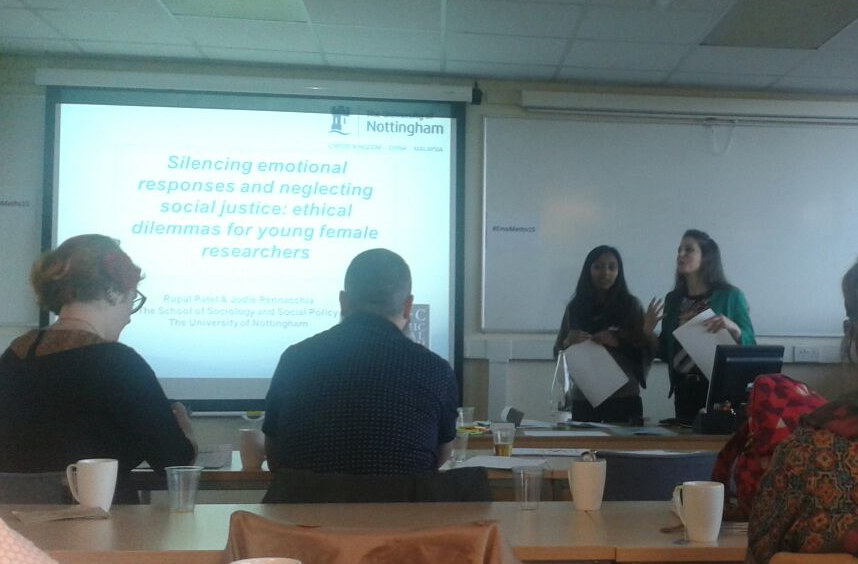
June 2, 2015, by Public Social Policy
Silencing Emotional Responses and Neglecting Social Justice: Ethical Dilemmas for Young Female Researchers
By Jodie Pennacchia and Rupal Patel
I am sitting in an assembly. A female external speaker has come in to discuss post-16 options. In order to ‘sell’ certain options she highlights the money students will get, for example for doing an apprenticeship. She addresses the girls in particular; “imagine how many Primark outfits you can buy for that money”. To ‘sell’ college she talks about the later start time and greater timetable flexibility and again addresses the girls: “so you can curl your hair and put your fake eyelashes on in the morning before you come to college”.
“How old are you?” I got asked midway through what seemed to be a successful interview. “24” I answered, feeling a little stunned by the sudden change in discussion. “You’re 24 and you’re doing this sort of work? Some would say it is good in this country but I don’t agree. Back in India women stay at home, value their family and serve their husbands and we are losing that now and that’s why problems start. My two girls were married by the age of 22. It’s best for our Gujarati culture to carry on this way otherwise problems will come. You probably won’t be able to carry on working then you see, you’re young you won’t understand now”.
We open with these ‘fieldwork moments’ in order to begin a discussion about the ethical dilemmas that arise when we are faced with views that test our values and political positions in the course of research. We approached our fieldwork with the expectation that we would encounter differences of opinion and welcomed these as inevitable products of investigating aspects of the social world. However, the experiences acknowledged above have led us to question the extent to which, as female researchers who are undertaking policy-orientated PhDs which foreground questions of social justice, we have an ethical duty to challenge views which are inherently sexist as these arise in our fieldwork, since they go against a social justice agenda by perpetuating gender-based inequalities.
In the three cases shared above, the views that were voiced were not challenged by us. In reflecting on why we made this decision, we could present a number of important arguments. First, that it did not feel ‘right’ in the moment. Research that brings us into close contact with people depends on relationships, and in building these relationships researchers will learn to ‘feel their way’ in different kinds of scenarios and with different kinds of people. As former MA Research Methods students we recognise that there is no text book to tell us how to do these things. Instead, in any single research moment, we depend on our instinct and our bank of previous experiences to guide us in decisions about what is appropriate. Therefore, our impression that it was inappropriate to challenge in these moments was, to some extent, grounded in experiential wisdom.
But was it also affected by other views and concerns? In discussions we have had since our experiences, we recognised that our decision not to challenge these comments was also dictated by fear, and a view that such challenge may alter the course of our data. In discussing fear we have teased out a number of concerns: would challenging our participants on such views lead to debate, or even worse, an argument? What would this mean about our status as researchers and professionals? Would the participant drop out? Can we really argue with people who are doing us a favour, after all without them we have no data? A separate but linked concern was that challenging a participant would lead our research into new territory and shape our data, perhaps in ways that we hadn’t anticipated and did not want. It may instantly damage the rapport that researchers work so hard to build. Would participants feel less able to share if we had challenged their views? Would they censor their views in future comments? Would they shut down future opportunities for data collection?
With these concerns in mind, in the moments described we prioritised our research and our role in the field. However, we identify that this decision is not without its problems. If we have wider ethical aspirations for ‘social justice’ through our research, is it problematic that we let these moments of injustice slip by? Researchers are encouraged to reflect on actions and on the research process more broadly once it has occurred, but is it enough to do this in hindsight? To what extent are we, as researchers, also responsible for enacting our political views when in the research field?
Our aim here is to recognise the endemic nature of such issues in social research that brings us into contact with people. Rather than treating these issues as resolvable, our aim is to begin a process of sharing and discussion. For us, these questions continue to loom large as we continue with our fieldwork and thesis writing, and recognise that these dilemmas will continue to come hand in hand with carrying out and writing about research. Therefore we welcome comment from fellow PhD researchers and academics, and encourage you to share related experiences with us. How do you reflect on similar dilemmas and have you resolved them in a way that you are comfortable with?
Image: presenting paper at Emotional Methodologies conference, University of Leicester, 19th May 2015
No comments yet, fill out a comment to be the first

Leave a Reply